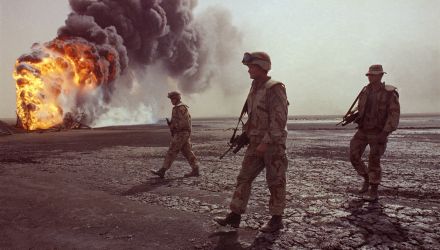The respected Arab-American political activist and analyst Jim Zogby published a worthy article in Huffington Post this week entitled, “A smart new Washington project,” about the new "Middle East Strategy Task Force" (MEST) just launched by the Atlantic Council think tank. According to its co-chairs former Secretary of State Madeleine Albright and former National Security Advisor Stephen Hadley, MEST aims to develop a long-term U.S. strategy to assist the Middle East achieve stability and prosperity.
The article* is worth reading because it nicely captures the fatal dilemma that has always defined American efforts to improve conditions in the troubled Middle East, especially when they emerge from a context of policy-making circles in Washington, D.C. Zogby knows American policy-making and Arab public opinion equally well, so we should consider seriously his sense that this MEST effort holds promise because of, “The stated resolve of the co-chairs to ground their work in the attitudes and needs of the Arab people. Instead of projecting policies developed in Washington for the people of the region, the MEST intends, as its starting point, to ascertain what the people of the region say they need and then craft policies that meld America's interests and capacity with Arab aspirations.”
I dearly hope that will happen, but I see no evidence to expect this outcome; in fact, the evidence is that the United States is repeating its well-established misguided analyses, biased policies, and dysfunctional interventions. Arab sentiments and aspirations have been known for many decades, but American policy-makers, including Albright and Hadley, have always routinely ignored them, for reasons that they and other American officials should explain one day.
At the MEST launch event, Zogby reviewed Arab public opinion based on the evidence from many years of polling across our region. He sees Arabs broadly as being "Confounded, Lacking Confidence, and Conflicted” about, “The traumatic changes that have rocked the region; the Arab loss of faith in the capacity of the United States to ‘do the right thing’ when it comes to intervention in Arab affairs; and despite this, the continuing strong desire of the Arab public to maintain good relations with the United States.”
He reminds us yet again that, “While Arabs have strongly favorable views toward the American people, values, culture, and products, they deeply resent American policy toward the region,” and American interference in the region is always ranked among the top threats to peace and stability that Arabs perceive. Arabs also consistently say that the United States can be most helpful by resolving the Israeli-Palestinian conflict.
This is important background context for what is happening now in the U.S.’s consistently confused view of how to achieve two goals that would appear to be obvious priorities for the United States and for all concerned in the region, including Israel: reconcile American values with American foreign policy, and achieve a historic meeting of minds and a convergence of shared policies and activism among Americans and those tens of millions of Arabs who have been fighting and dying for four and a half years now in their stalled uprisings against Arab dictators and autocrats, corruption, mismanagement and brutal governance.
My doubts about the U.S. government’s ability to change its policies in the Middle East have been reinforced by how it and Arab governments have responded to the threat of the Islamic State in Iraq and Syria (ISIS). Astoundingly, incomprehensibly, American and Arab officials continue to repeat the same mistakes vis-a-vis ISIS that they made in their fight against Al-Qaeda over the past quarter century. Three in particular stand out: They emphasize military attacks against the criminal Islamist militants, but effectively ignore socio-economic and political issues that underpin Al-Qaeda and ISIS. They ignore the equally criminal policies of family-run Arab security states whose excesses and failures since the 1970s spawned these dangerous militant movements. They absolutely refuse to address the glaring parallel misdeeds of American governments that have long been complicit in supporting Arab dictatorships; fostered radicalism, despair and anti-American sentiments among Arab publics through their militarism and Palestine-Israel policies; and, provided the enabling environment in Iraq in 2003 that helped Al-Qaeda to take root there and later spread to Syria and to spawn ISIS.
I hope and pray that Zogby’s positive expectations from the MEST venture prove to be correct. I would dearly love to see a constructive shift in American policy in the Middle East that could align more closely with reasonable and legitimate Arab aspirations, the international and domestic rule of law, and a secure existence for all states in the region, whether Arab, Israeli, Iranian or Turkish. Zogby’s thoughtful comments remind us that we know what is needed to move in that direction, given the strong convergence between the values and aspirations of Americans and Arabs; but looking at all state policies in the region today reminds us that American and Arab officials consistently and collectively still lack the courage, honesty and political will to address the full set of policies — by Arabs, Americans, Israelis, Russians and others — that have led to the region’s troubled state today.
Al-Qaeda, ISIS and their offshoots today are the fastest growing political brands in the Arab world, despite a quarter century of continuous Arab and American war against them. Huh?
* http://www.huffingtonpost.com/james-zogby/a-smart-new-washington-project_b_7524952.html?utm_content=buffer058b2&utm_medium=social&utm_source=twitter.com&utm_campaign=buffer
Khouri, Rami. “What prospects for Arab, American policy changes?.” Agence Global, June 13, 2015





